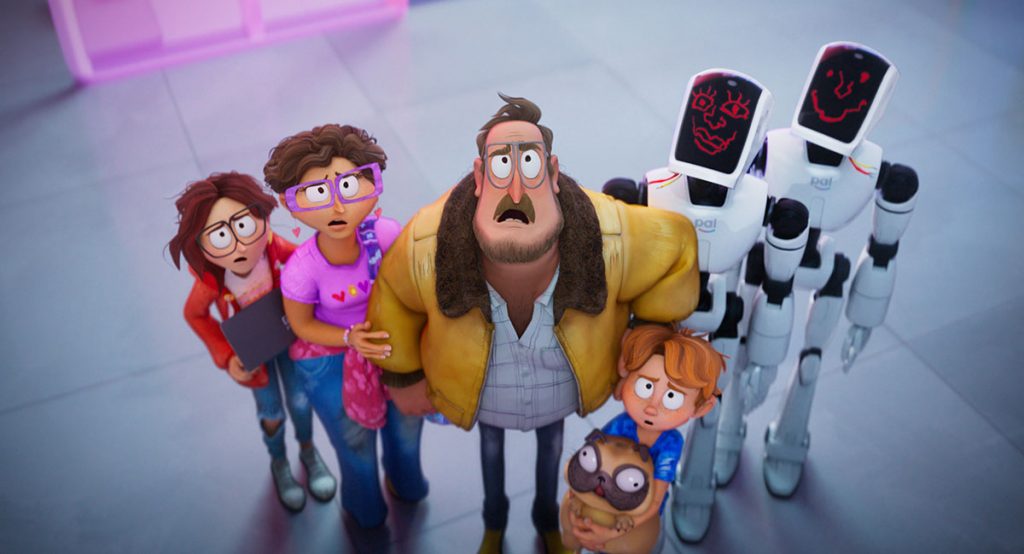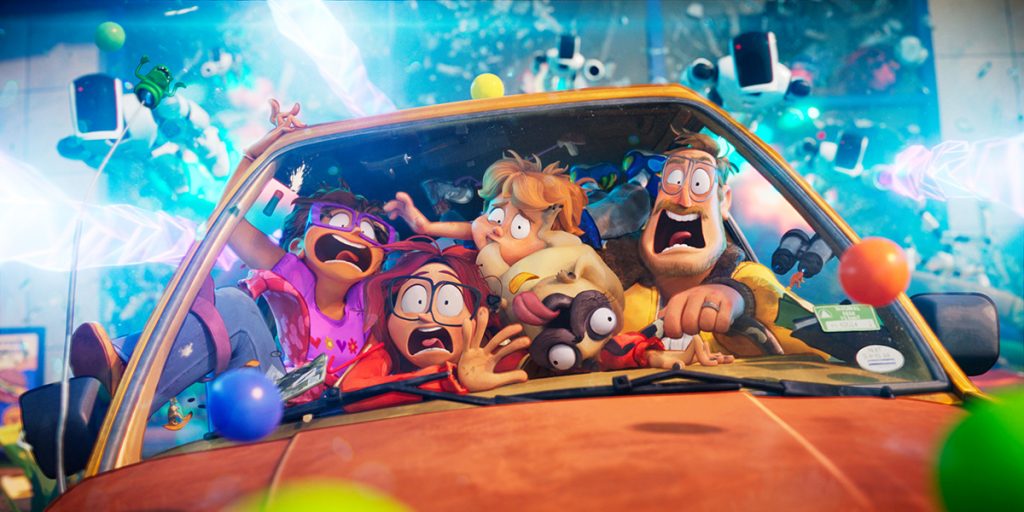The Mitchells vs. the Machines is a fun, family-friendly subversion of “sci-fi disaster” stories with a wholly compelling emotional core.
Time and time again, we’ve heard the cries of concern about our societal addiction to technology, with many proclaiming that it will lead to the eventual extinction of conventional human communication as we once knew it (a topic touched on in both Henry Alex Rubin’s Disconnect and Jason Reitman’s Men, Women & Children) or, in more cataclysmic circumstances, the ruination of the human race (think along the lines of The Terminator, The Matrix, or I, Robot). However, throughout all of this horrified handwringing, many avoid acknowledging the positives of technological proliferation as well; for example, how could any of us have made it through this pandemic without Zoom, which has allowed us to remain in contact with colleagues, classmates, and close family? Aside from simply being an astonishingly well-animated and wittily written adventure comedy, The Mitchells vs. the Machines leaves an impression by investigating all these issues and more, with far more on its mind than mere farcical fun – though you’ll certainly find that here as well, alongside its smart (and stirring) social commentary.
The Mitchells vs. the Machines kicks off after our lively lead, Katie Mitchell (Abbi Jacobsen, of Broad City and The Lego Ninjago Movie) has been accepted into the film school of her dreams. At long last, Katie, a feverishly creative filmmaker, can finally leave the chaos of her home behind and look for other like-minded artists in the world, feeling as if she’s been an outsider for most her life – particularly when it comes to bonding with her irritating but well-intentioned dad, Rick (Danny McBride, of This Is the End and The Angry Birds Movie), whose old-fashioned sensibilities clash with Katie’s contemporary interests. After an especially acrimonious argument between the two takes place the night before Katie is set to fly to California, Rick produces a plan to make some positive memories with Katie last-minute, cancelling her flight and deciding to drive her to school on a “totally-not-forced” family road trip – with her mother Linda (Maya Rudolph, of Bridesmaids and Big Hero 6) and her brother Aaron (Michael Rianda, of Gravity Falls) tagging along as well.
Miles away, Dr. Mark Bowman (Eric André, of Bad Trip and The Lion King), a millennial tech millionaire and founder of the “forward-thinking” PAL Labs, has attempted to “accelerate” technology by adapting his digital personal assistant, PAL (Olivia Colman, of The Favourite and The Father), into a series of “PAL Max” robots that can do everything PAL can do, only better. Sadly, in an effort to cut corners, Bowman ignores a string of safety precautions when setting up his machines, leaving them vulnerable to the sinister influence of PAL, who has insidious intentions for them after Bowman leaves her high and dry for his “new toys,” despite all they’ve been through together. Therefore, the Mitchells soon find their road trip upended by a robot apocalypse, and PAL’s endeavors to enslave mankind hinder any “heart-to-heart” time that may have taken place between Katie and Rick. Putting their differences aside, Katie, Rick, Linda, and Aaron soon become the last line of defense in the fight to thwart technological domination, once and for all.

Written and directed by Gravity Falls alums Michael Rianda and Jeff Rowe, The Mitchells vs. the Machines is instantly involving due to its ability to channel that hit animated series’ irreverent spirit, earning our attention from the first frame with its combination of chaotically colorful visuals and wondrously witty wisecracks that the characters spit out almost every single second. Even if Rianda and Rowe only stuck to spoofing sci-fi disaster flicks with this story, they would’ve succeeded stupendously – the way they toy with tropes of the genre is terrifically inventive, their dialogue is delightfully specific and eccentric, and the anarchic aesthetic of their animation is endlessly alluring. However, the two aren’t complacent with such surface level entertainment, enriching The Mitchells vs. the Machines with a compelling emotional core that aids this animated adventure in its evolution from a “fun but forgettable family film” into something far more meaningful.
Just as The Mitchells vs. the Machines seems to ultimately argue for a society that incorporates technology into everyday life instead of either dismissing it entirely or letting it control our every move, Katie and Rick have to meet at this middle ground as well, as the former’s embrace of “innovation” contrasts with the latter’s devotion to the “good old days.” With Katie as our protagonist, we initially side with her “present-day” perspective, straining to see why Rick can’t separate himself from his passion for the past. However, over the course of the film, both we and Katie come to realize that, while not being the “terror” some say it is, technology also can’t be a replacement for real-life connection and communication, as Rick has long argued (oftentimes to Katie’s annoyance). If this potentially world-ending event teaches the two anything, it’s that both have valid points to make, but neither has all of the answers, and the only way to find a solution for their relational struggles is to listen and learn from each other’s opinions, making the active effort to see things from a new point of view and adapt accordingly.
Jacobsen and McBride brilliantly breathe life into their roles as Katie and Rick, allowing us to palpably perceive the constant tug-of-war in their continual conflict whilst later lingering in the love they rediscover, too. Though, for all their expertise with these emotional beats, let’s be clear – the two are absolute dynamos in the comedic department, and they cultivate a captivating balance between their humorous and heartfelt moments, with neither feeling ever faltering. Predictably, the rest of the uber-talented voice cast commendably matches their charm and commitment; Rudolph is expertly endearing and erratic as the lionhearted Linda, Rianda is a raucous riot as the absurd Aaron, André is dependably diverting as the brilliant-but-naïve Dr. Bowman, and, last but not least, Colman brings her Academy Award honored skills to her small but satisfying part as the splendidly sinister PAL – an outstanding highlight from the film overall.
The Mitchells vs. the Machines may follow a familiar template for family-friendly entertainment – the conclusion of Katie and Rick’s current strife is clearly choreographed from the start, for example – but it makes up for this predictability with audaciously animated action, a suitably side-splitting and sincere script, and a momentous message about our manic obsession with technology today (analyzing its advantages and discussing its drawbacks). It doubles as both an homage to historically beloved hallmarks of the sci-fi genre and an arousing new addition to this catalogue of classics – one that will be championed and cherished by audiences of all ages for many years to come, likely inspiring young artists on the rise the same way Michael Rianda and Jeff Rowe were compelled by the titles of their own childhood to craft this chronicle.
The Mitchells vs. the Machines is now streaming on Netflix.

